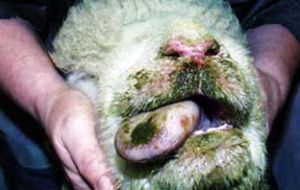MercoPress. South Atlantic News Agency
First bluetongue case in England; fears of more FAM
 There is no treatment once infected
There is no treatment once infected Beleaguered British farmers suffering after several outbreaks of foot-and-mouth face a second threat as a new livestock virus, bluetongue, claimed the life of a Highland cow in Suffolk, east England.
British government vets are trying to determine if the UK's first case of the insect-borne bluetongue virus found at the Baylham House Rare Breeds Farm, near Ipswich has passed to other animals on the farm. The strain of the disease - serotype eight - is the same as one that has devastated cattle and sheep herds across Belgium, France, Germany, Luxembourg and Holland in the past year and is transmitted by the Culicoides imicolamidge The infected cow's carcass has been removed from the farm and further tests are now being carried out on other livestock on the premises to see if they have been affected by the disease. The Department for Environment, Food and Rural Affairs (Defra) said it would not be classed as an outbreak unless other cases were confirmed. A 20km control zone will be placed around the farm if bluetongue appears to have infected other animals and insects. Defra said tests were ongoing and it was unlikely any results would be announced on Monday. Government chief vet Debby Reynolds said farmers should remain vigilant, and report any suspect cases. The disease, which affects, cattle, goats, sheep and deer, is not spread directly from animal to animal - only through midge bites. Once an outbreak is confirmed, culling animals is not official policy, said microbiologist Professor Hugh Pennington. Humans cannot catch the disease. Some scientists believe that climate change could be behind the spread of the bluetongue midge, as warmer temperatures have seen the biting insects gradually move north. Deputy Chief veterinary officer Fred Landeg said that if the disease took hold in Britain, a frosty winter could help wipe out the midge population. But the president of the British Veterinary Association, David Catlow, said Britain may have to "learn to live" with bluetongue by restricting movements of infected animals until a vaccine is made available. Animals with the disease experience discomfort, with flu-like symptoms, and swelling and hemorrhaging in and around the mouth and nose. They can also go lame and have difficulty eating. On Sunday Agriculture Minister Lord Rooker told a fringe meeting at the Labour party conference that ministers had already planned for the possibility of the disease arriving in Britain. "We have been expecting it because of what's happened in Europe in the last couple of years. It's come from North Africa. It isn't a surprise. We were expecting it." Environment Secretary Hilary Benn said: "This is obviously unwelcome news at a very difficult time for farmers who are already dealing with the restrictions we have had to put in place to contain foot-and-mouth disease." Meantime British farming leaders have called for the government to consider aid packages for those facing bankruptcy in the wake of movement restrictions brought in because of foot-and-mouth. They say the restrictions mean farmers cannot buy and sell animals at a crucial time of year. NFU president Peter Kendall has warned that farmers are facing "financial Armageddon" as a result of the crisis. Separately, a suspected foot-and-mouth case is being checked in Hampshire. Officials confirmed on Sunday that a 3km temporary control zone was placed around premises near Petersfield. If confirmed, the latest case of foot-and-mouth would become the fifth since the disease was confirmed on a farm near Egham, Surrey, on 12 September and the seventh in southern England since the beginning of August. Some 1,800 animals have so far been slaughtered but some of the movement restrictions outside the current surveillance zone have been lifted. An earlier outbreak in August, which affected two premises, was blamed on the virus escaping from leaking pipes at the nearby Pirbright laboratory site.




Top Comments
Disclaimer & comment rulesCommenting for this story is now closed.
If you have a Facebook account, become a fan and comment on our Facebook Page!